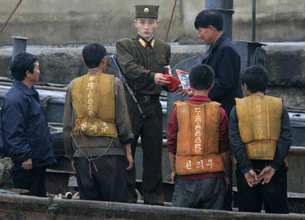North Korea: IDs to include data chips
| Publisher | Radio Free Asia |
| Publication Date | 21 August 2012 |
| Cite as | Radio Free Asia, North Korea: IDs to include data chips, 21 August 2012, available at: https://www.refworld.org/docid/503def8b19.html [accessed 1 June 2023] |
| Disclaimer | This is not a UNHCR publication. UNHCR is not responsible for, nor does it necessarily endorse, its content. Any views expressed are solely those of the author or publisher and do not necessarily reflect those of UNHCR, the United Nations or its Member States. |
2012-08-21
An identification card update will mean more controls over the citizens of North Korea.
 A North Korean border guard checks the documents of boat passengers in Sinuiju, Oct. 25, 2006. AFP
A North Korean border guard checks the documents of boat passengers in Sinuiju, Oct. 25, 2006. AFP
Authorities in repressive North Korea are planning to exert even stricter controls on citizens by issuing electronic identification cards containing personal information, according to sources inside the country.
According to one source, who spoke to RFA on condition of anonymity, the current plastic IDs will be replaced with cards containing circuit chips which store data about the cardholder, including address, family background, and record of travel.
"North Korean people will be made to bring the new ID cards when they travel so security officers can know everything about their trip, such as the person's destination, when he or she has traveled, and how many times they have traveled," the source said.
The new focus on ID cards shows that the North Korean regime is devoting resources to strengthening its control over the people through improving its policing network, despite worsening economic conditions and ongoing food security concerns.
The North Korean source said that this will be the fifth time that North Korea is changing the ID cards of its citizens. The current plastic card has been in use since 2001 and had replaced a booklet-style form of identification.
The source said that the new cards are the same as those that will be used to upgrade identification cards in China beginning next year and that Beijing has strongly supported Pyongyang's adoption of the new technology, which would help control movement across their shared border.
Experts have suggested that North Korean Chief of National Police Lee Myeong Su recently visited China on a fact-finding mission concerning new technologies that could help the state monitor its population.
A source from China, who also spoke on condition of anonymity, said authorities have recently stepped up checks on North Koreans traveling into the country.
"Police officers get on trains which come in across the border carrying metal detectors and searching every single passenger car," the source said.
"Also, police officers at the turnstiles frisk people with metal detectors."
Another source from North Korea near the Chinese border also reported increased checks on North Koreans.
"North Korean people should be able to move freely and make money from trade, but now it's much harder than before because of constant government surveillance," the source said.
However, the source said, North Korea's worsening power grid, which has suffered severe shortages, may limit the effectiveness of the new IDs.
Reported by Young Jung for RFA's Korean service. Translated by Juhyeon Park. Written in English by Joshua Lipes.
Link to original story on RFA website
